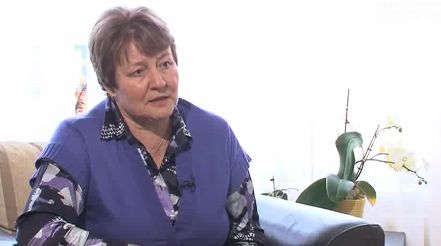| Ilma Čepāne |
 |
|
Interviewer. What was with the Putsch? What happened to you then? ¬Ý I. ƒåepƒÅne The Putsch? It so happened that when the Putsch began‚Ķ ¬Ý Interviewer. 19 August‚Ķ ¬Ý I. ƒåepƒÅne Yes, I remember‚Ķ when [TV news] announcer Puri≈Üa was reporting it, I was on my way out of the house‚Ķ My husband at the time, Alfrƒìds ƒåepƒÅnis [member of the Supreme Council of the Republic of Latvia]‚Ķ we saw all of it‚Ķ but because my father was on his deathbed, I had to go to him. My father died two days after the Putsch, so I was not present at the actual‚Ķ the real proclamation of independence. And not because I was fleeing from something‚Ķ ¬Ý Interviewer. Oh, of course... ¬Ý I. ƒåepƒÅne ...but it was really‚Ķ Because my father meant a lot to me. And I had to be‚Ķ ¬Ý Interviewer. But he sort of experienced 21 [August]‚Ķ? ¬Ý I. ƒåepƒÅne His condition was very serious‚Ķ But he understood that the Putsch had failed. He understood that. ¬Ý Interviewer. So he could die in peace‚Ķ ¬Ý I. ƒåepƒÅne I think he died in peace because he understood‚Ķ Yes, he understood because he had been waiting for it. ¬Ý Interviewer. So you spent those hectic days of the Putsch at your father‚Äôs bedside‚Ķ ¬Ý I. ƒåepƒÅne And you know what I thought about most at the time? I mostly thought about how would I be able to bury my father. Because we already knew‚Ķ He had cancer‚Ķ And we knew that he could pass away at any moment‚Ķ And I thought that chaos would set in, that we wouldn‚Äôt be able to buy anything, that it would begin‚Ķ ¬Ý Interviewer. Yes, if the Putsch had continued‚Ķ ¬Ý I. ƒåepƒÅne Yes, if it had continued‚Ķ But then imagine how it all would be. My main thought was: how would I bury him at such a time? ¬Ý Interviewer. Yes, how the Wheel of Fortune turns‚Ķ ¬Ý I. ƒåepƒÅne Yes‚Ķ Because I would definitely have‚Ķ what we all went through‚Ķ and now to reproach those colleagues of mine who could not be present back then for various reasons because everything was happening so fast‚Ķ I listened to it happening on the radio‚Ķ As strange as it may seem, I had mixed feelings: I knew that my duty was to be with my father because I believe that there are two main values in life ‚Äì family and health‚Ķ But at the same time, I wanted to be at the epicentre of everything that was going on‚Ķ Because I was convinced that we had to do it regardless of the consequences. ¬Ý Interviewer. What would have happened if the Putsch‚Ķ well, it would not have dragged on for long, but if, let‚Äôs say, it had continued for a couple of months‚Ķ ¬Ý I. ƒåepƒÅne Well, as I remember‚Ķ Do you recall the ‚Äúlittle swan dances‚Äù from Moscow, only‚Ķ and afterwards the emergency‚Ķ what were they called? Emergency Committee announcements‚Ķ and Rubiks [member of the Politburo of the Communist Party of the Soviet Union, First Secretary of the Communist Party of Latvia and Chairman of the State Committee for Emergency Situations of the Republic of Latvia] repeated them. And I thought that they would take their revenge on us. ¬Ý Interviewer. Well, haven‚Äôt you heard‚Ķ they say‚Ķ even ƒ∂ezbers [leader of the Democratic Labour Party of Latvia] had written it in his memoirs; I asked ƒ∂ezbers‚Äô wife, and she said that there had been lists with the names of all of those who supposedly were and who had to be shot. ¬Ý I. ƒåepƒÅne Yes, Alfrƒìds [ƒåepƒÅnis] told me‚Ķ So you can ask Alfrƒìds‚Ķ You could have interviewed us together‚Ķ We are on very good terms‚Ķ But he told me that he also knew about it because there really had been lists of those who had to be eliminated, physically‚Ķ Later some said that there had even been people who were to be eliminated along with their whole families and even more‚Ķ I think a lot of us would have been eliminated because they would have had no mercy. But at the same time, they still had to consider what the international community would say. I think that had a major effect. And it would not be that easy to take revenge on everyone. ¬Ý Interviewer. Yes, but there were no mobile phones back then or anything‚Ķ information was only‚Ķ ¬Ý I. ƒåepƒÅne Yes, but all information was delivered anyway‚Ķ I was later told that we had been one of the first delegations, even from the Supreme Councils‚Ķ We were there before‚Ķ I think it was right before the Putsch, when there still was‚Ķ The Russian ambassador to Sweden was sitting next us because we could not talk otherwise‚Ķ afterwards they drove us around and pointed out places where support actions had been organised‚Ķ There had been rallies, demonstrations‚Ķ in support of Baltic freedom. |

